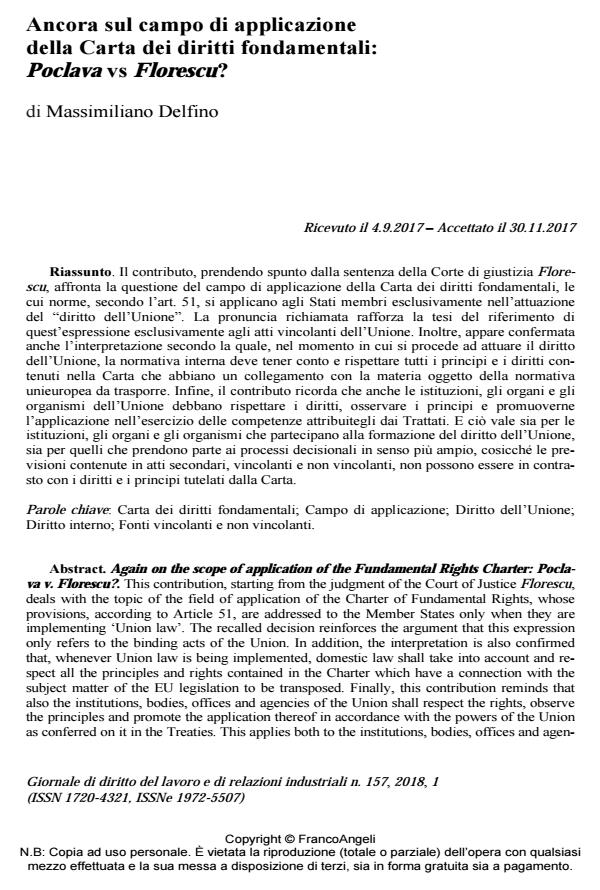Ancora sul campo di applicazione della Carta dei diritti fondamentali: Poclava vs Florescu?
Titolo Rivista GIORNALE DI DIRITTO DEL LAVORO E DI RELAZIONI INDUSTRIALI
Autori/Curatori Massimiliano Delfino
Anno di pubblicazione 2018 Fascicolo 2018/157
Lingua Italiano Numero pagine 12 P. 183-194 Dimensione file 188 KB
DOI 10.3280/GDL2018-157007
Il DOI è il codice a barre della proprietà intellettuale: per saperne di più
clicca qui
Qui sotto puoi vedere in anteprima la prima pagina di questo articolo.
Se questo articolo ti interessa, lo puoi acquistare (e scaricare in formato pdf) seguendo le facili indicazioni per acquistare il download credit. Acquista Download Credits per scaricare questo Articolo in formato PDF

FrancoAngeli è membro della Publishers International Linking Association, Inc (PILA), associazione indipendente e non profit per facilitare (attraverso i servizi tecnologici implementati da CrossRef.org) l’accesso degli studiosi ai contenuti digitali nelle pubblicazioni professionali e scientifiche.
Il contributo, prendendo spunto dalla sentenza della Corte di giustizia Florescu, affronta la questione del campo di applicazione della Carta dei diritti fondamentali, le cui norme, secondo l’art. 51, si applicano agli Stati membri esclusivamente nell’attuazione del "diritto dell’Unione". La pronuncia richiamata rafforza la tesi del riferimento di quest’espressione esclusivamente agli atti vincolanti dell’Unione. Inoltre, appare confermata anche l’interpretazione secondo la quale, nel momento in cui si procede ad attuare il diritto dell’Unione, la normativa interna deve tener conto e rispettare tutti i principi e i diritti contenuti nella Carta che abbiano un collegamento con la materia oggetto della normativa unieuropea da trasporre. Infine, il contributo ricorda che anche le istituzioni, gli organi e gli organismi dell’Unione debbano rispettare i diritti, osservare i principi e promuoverne l’applicazione nell’esercizio delle competenze attribuitegli dai Trattati. E ciò vale sia per le istituzioni, gli organi e gli organismi che partecipano alla formazione del diritto dell’Unione, sia per quelli che prendono parte ai processi decisionali in senso più ampio, cosicché le previsioni contenute in atti secondari, vincolanti e non vincolanti, non possono essere in contrasto con i diritti e i principi tutelati dalla Carta.
Parole chiave:Carta dei diritti fondamentali; Campo di applicazione; Diritto dell’Unione; Di-ritto interno; Fonti vincolanti e non vincolanti.
Massimiliano Delfino, Ancora sul campo di applicazione della Carta dei diritti fondamentali: Poclava vs Florescu? in "GIORNALE DI DIRITTO DEL LAVORO E DI RELAZIONI INDUSTRIALI " 157/2018, pp 183-194, DOI: 10.3280/GDL2018-157007